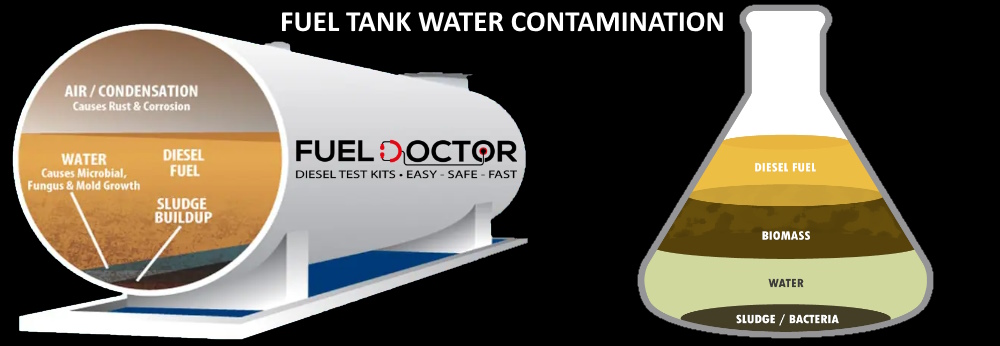Water and diesel fuel do not make great friends in life if they manage to get together. Water in your fuel will foster the growth of microbial bacteria and these types of bugs can even damage the walls of steel tanks if left unchecked.
This growth has can cause defects to engine and fuel components, resulting in repairs that will burn your bank balance and also result in your equipment being out of service. Yes, it’s quite normal to find water in your diesel fuel tanks, but there is a fine line when small amounts can turn into a large problem.
Acceptable Levels of Water in Diesel Fuel
The acceptable level of water in diesel fuel is no more than 200 mg/L / parts per million as per EN 590 standards
Why Water is in Your Diesel Fuel Tank

There are several reasons why water is inside your fuel tank:
Condensation.
Diesel is a stable fuel that produces little fumes unlike gasoline. The lack of vapour in diesel tanks means there is the possibility for air to enter your tank unopposed from any positive pressures. As the daily temperature changes from hot to cold the fuel tank draws in humid air that collects as water condensation on the inside walls of the tank which drops into your fuel. Over time this water condensation can cause large amounts of water in your diesel tanks to accumulate.
Poor Fuel Handling.
Water is often placed into diesel tanks while filling up and when poor handling of the fuel happens due to errors that you have no control of. Fuel stations are usually careful to separate water from their diesel while in storage tanks and when you pump from them, but it’s still possible to transfer water into your rank when refilling from a contaminated tank at a fuel station. You just never know what your getting sometimes from fuel stations.
Tank Caps and Filler System Leaks.
Leaks in filler caps or fuel filler systems can allow water and other contaminants to enter your tank.
Signals Water is in Your Diesel
As mentioned, it’s normal to find small amounts of water in your diesel fuel – you really cannot have zero PPM parts per million of water levels in diesel. If the water level is low then it won’t create issues that you should worry about as your water separator like a Racor filter water separator will take care of this. But be warned that excessive amounts of water in your diesel will allow the growth of microbes to grow. Eventually, this will damage your injectors, your fuel lines, damage your fuel pumps, diesel tanks and key components in your engine.
Key symptoms of water in your diesel tanks to look out for
Engine lacks power
Difficulty in engine starting
Surging up/down idle speeds
White smoke from exhaust system
Damaged fuel injectors and pumps

Testing for Water in Your Diesel Fuel and Tank
Expensive diesel repairs due to water in the system is a common problem, it’s a requirement to keep an eye on the quality of fuel in your tank.
Most diesel-powered vehicles and equipment have a water separator in the fuel system. You can check it yourself to make sure it’s not gathering large amounts of water, a simple drain of the water from the filter like in the images below is usually all you need to do to remove the contamination.

Check the diesel tanks. One of the best ways to test for water is to look into your tanks with a flashlight, visually the fuel should be clear and bright.
Diesel that has become contaminated with water is darker than usual. Clean diesel is clear and light coloured in appearance. Dark or cloudy fuel can tip you off that there is water in the fuel system already.
NB – for tax evasion purposes some fuel makers add coloured dyes to their fuel for identification and law enforcement.
Water in diesel testing kits. You can use water in diesel fuel testing kits that quickly and safely indicates water in your fuel. Our kits can perform tests in just minutes and they can be used in the field or in the workshop without the need for an expensive laboratory analysis.

Summing Up
Water in your diesel tanks can become a problem which result in major repairs if you don’t test on a regular basis. Testing should be a part of your regular engine maintenance program.
